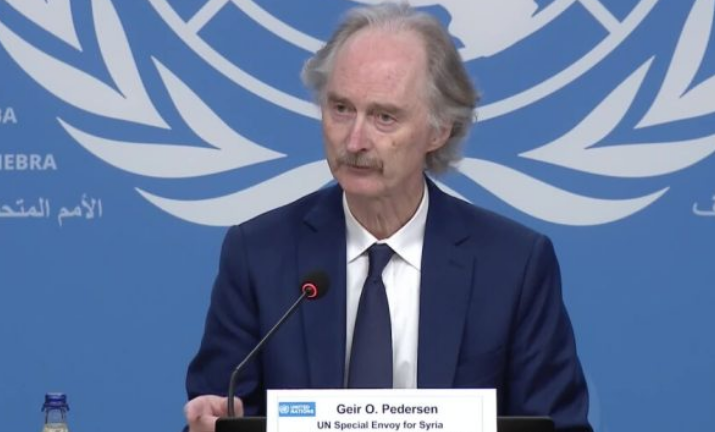Damascus (Web Desk): United Nations (UN) Special Envoy for Syria Geir Pedersen, arrived in Damascus on Sunday, expressing a strong desire to increase humanitarian aid to the war-torn country, which is navigating the aftermath of a devastating 13-year conflict.
His visit followed the unexpected fall of President Bashar al-Assad, who was overthrown by rebel forces led by Hayat Tahrir al-Sham (HTS).
Pedersen described the shift in power as monumental, sparking cautious optimism for Syria's future.
However, he acknowledged the many obstacles that remain in the wake of such a significant change and emphasized the importance of managing this transition carefully from the very start.
While the political landscape of Syria has shifted dramatically, Pedersen stressed that a comprehensive and inclusive political process is essential, one that must be driven by Syrians themselves.
He also noted that rebuilding state institutions—particularly in terms of ensuring public services and maintaining security—will be critical to the country’s stability.
Addressing the humanitarian crisis is another urgent matter, with Pedersen calling for an increase in assistance, both for those in need within Syria and for the refugees who wish to return home.
Pedersen pointed to the need for rapid economic recovery, stressing that resolving the economic challenges should be a top priority.
He expressed hope that international sanctions could be lifted soon, which would allow the country to begin the difficult process of reconstruction.
At the same time, he emphasized the importance of justice, insisting that those responsible for war crimes must be held accountable.
He called for a fair and credible justice system to prevent any acts of revenge that could further destabilize the country.
On a different front, US Secretary of State Antony Blinken recently confirmed that American officials have been in communication with the newly emerging leaders in Syria, particularly those linked to HTS.
Despite the group being designated by the US as a terrorist organization since 2018, Blinken acknowledged the necessity of engaging with HTS to convey important messages about how the group plans to govern during this period of transition.
While HTS has a controversial past, having once been affiliated with al-Qaeda, its leaders assert that they have moved away from extremist ideologies.
The group's efforts to establish security and reassure a population wary of its rise to power reflect its ongoing attempts to navigate the complexities of governance in the wake of Assad’s fall.
The situation in Syria is fluid and uncertain, and the international community, as well as Syrians themselves, will have to work together to ensure that the country can emerge from its long period of conflict.
Pedersen’s remarks underscored the importance of taking a careful, inclusive approach to rebuilding Syria and addressing the many challenges it faces in the months and years ahead.


